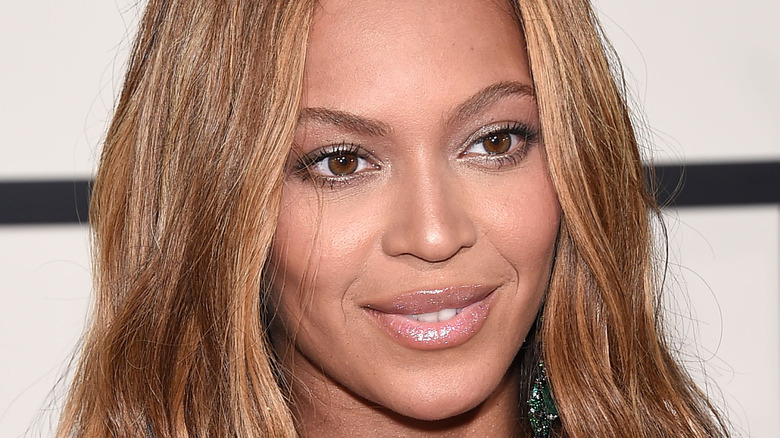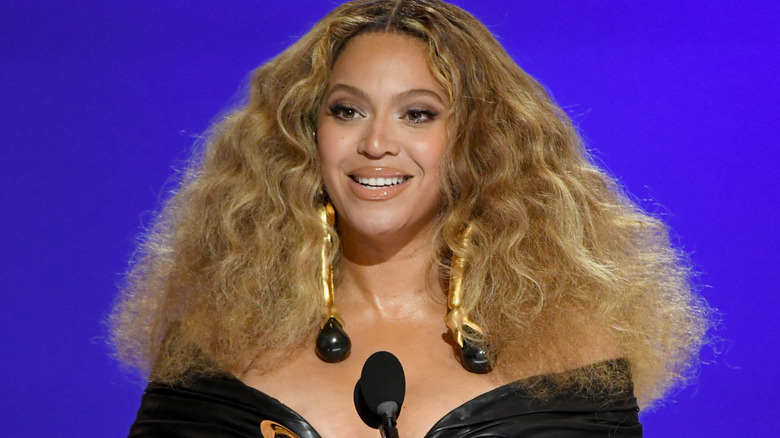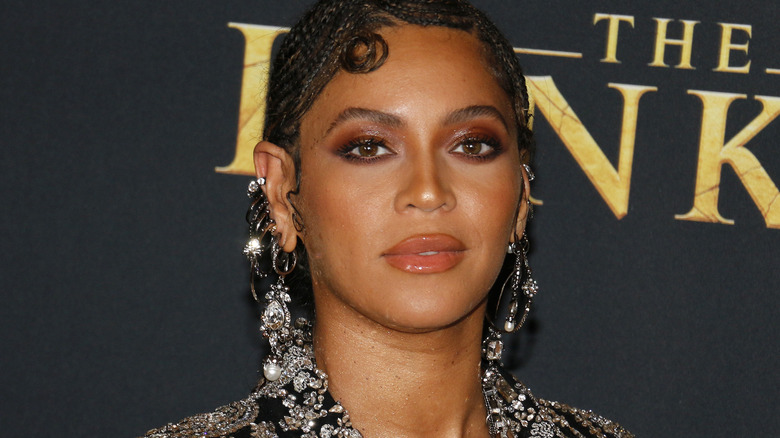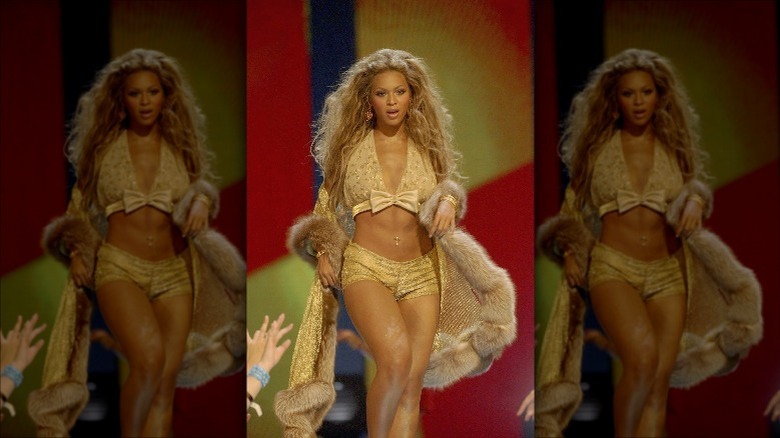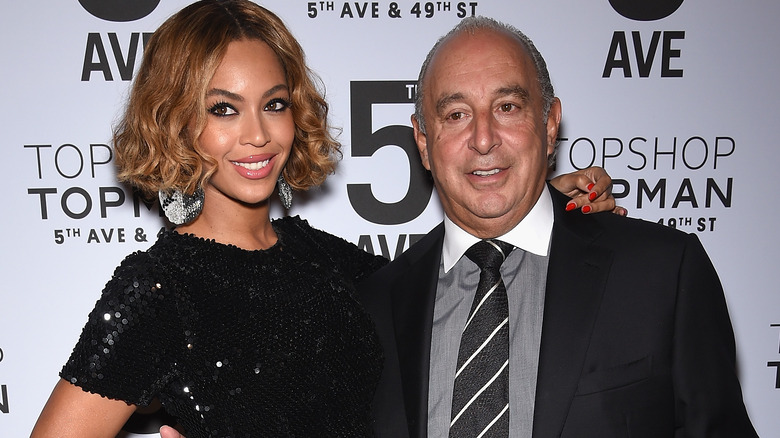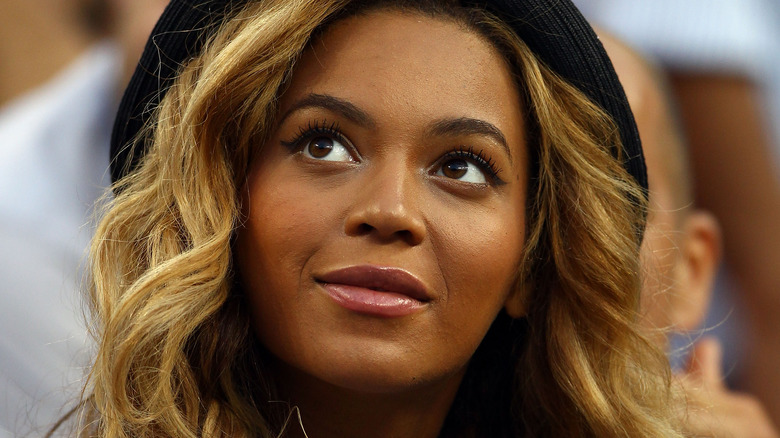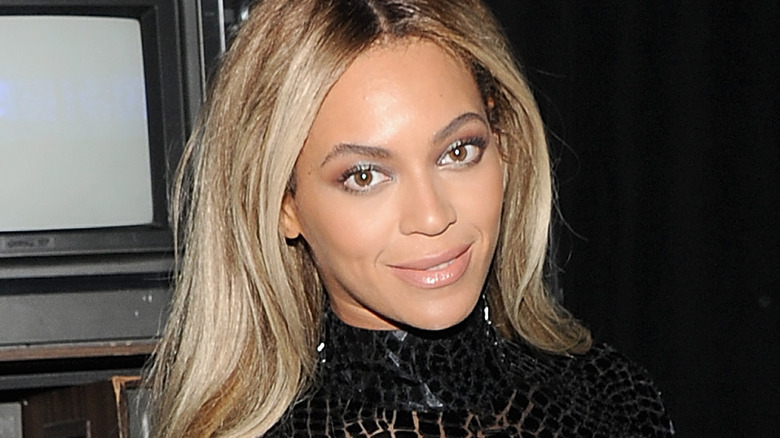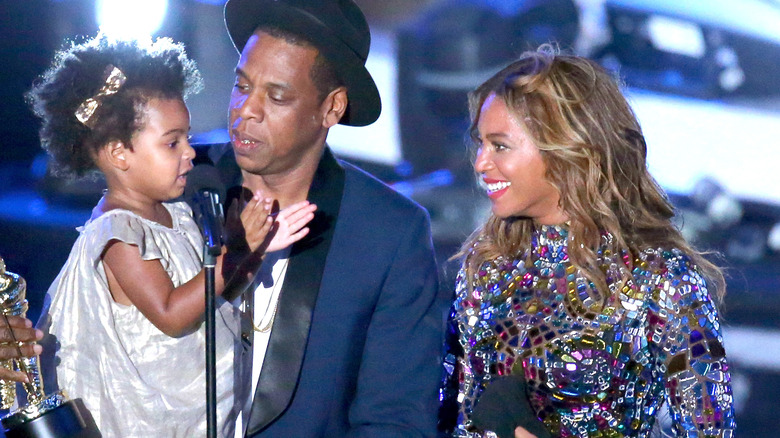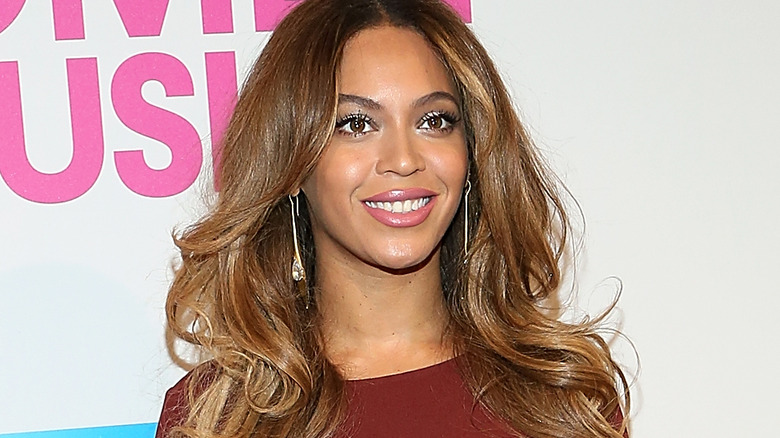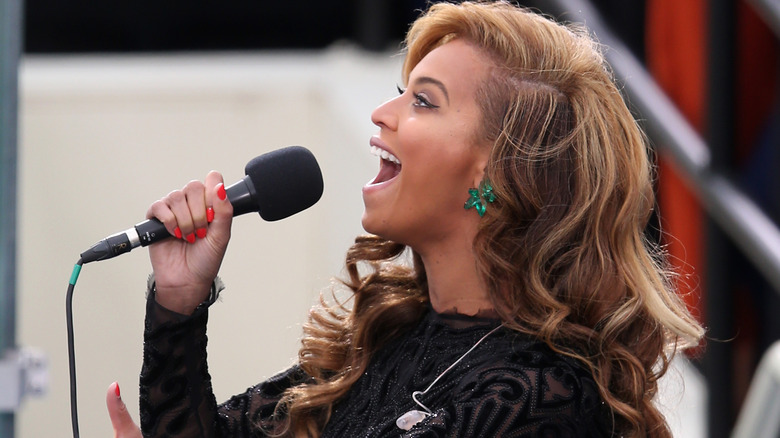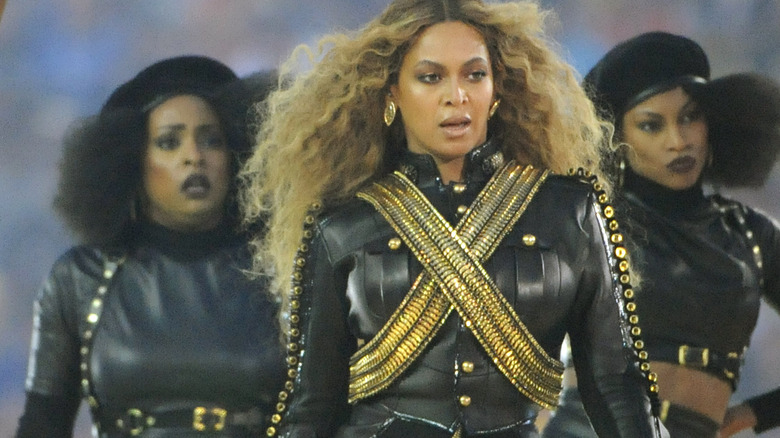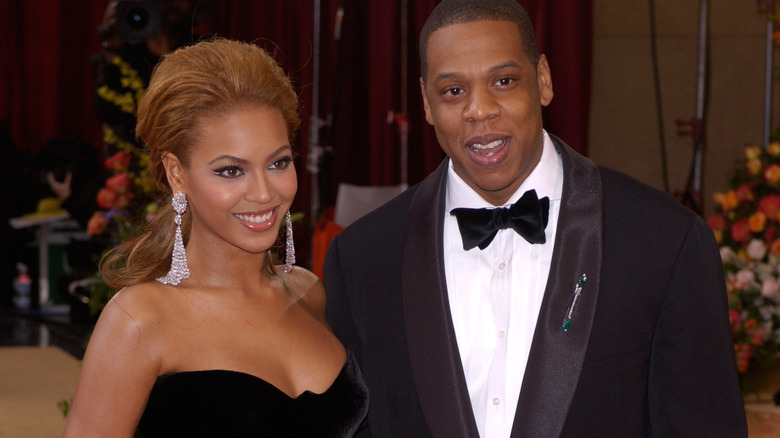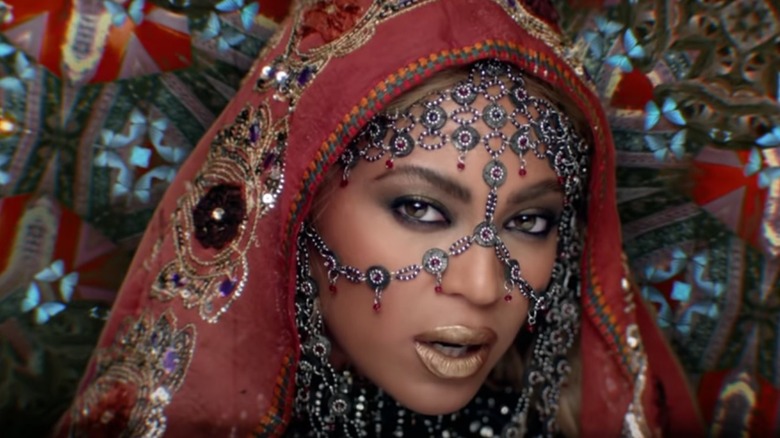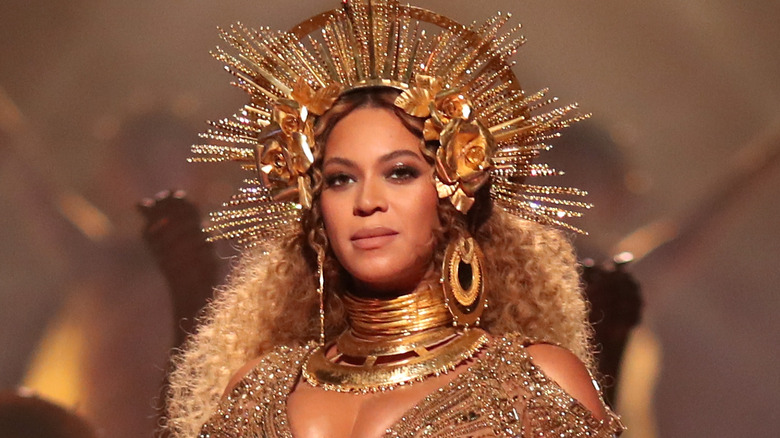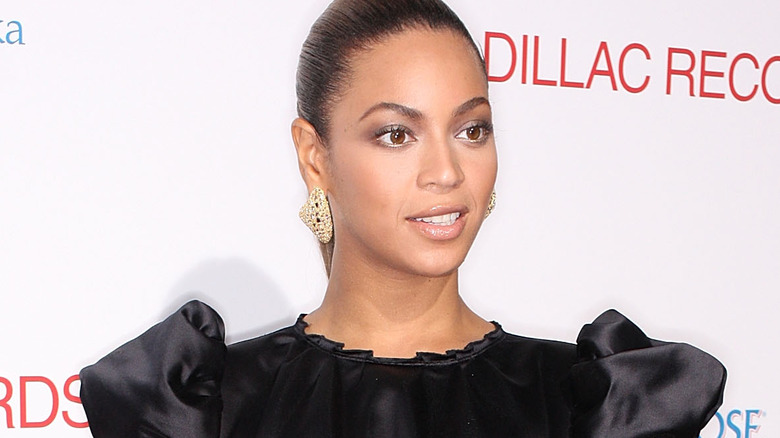Beyonce's Most Controversial Moments Ever
From Sasha Fierce to Beysus, Beyoncé is a powerhouse performer who never fails to generate album sales — not to mention headlines. Ever since she first mesmerized fans via Destiny's Child and their confluence of girl power and family friendly, Christian-infused R&B, it was evident that Beyoncé was the cynosure of the outlet. Soon enough, she released her debut solo album "Dangerously in Love" in 2003 and Queen Bey was born. And being one half of music's greatest power couple with husband Jay-Z, Beyoncé is raking in millions (her net worth is a whopping $500 million), as well as cementing her status as a true cultural icon.
Always one to embrace the changing times, Bey has achieved the impressive feat of retaining popularity across generations, being highly lauded among both millennials and their mortal enemies, Gen-Z. And with the release of her seventh solo album "Renaissance," it seems as though the Beynaissance is showing no signs of slowing.
The singer remains an iconic albeit polarizing figure. In spite of her huge popularity, Beyoncé, as with most superstars, has faced the wrath of public detractors. Accordingly, throughout her reign as Queen B, she has courted innumerable controversies, many of which belied what was expected from her as an artist. Other times, however, she was unfairly targeted as a figure of contention. From dubious labor practices to eyebrow-raising lyrics, Beyoncé has her share of shade. Get ready for 50 shades of Bey: These are Beyoncé's most controversial moments ever.
Beyoncé used an ableist slur
In 2022, Beyoncé released her hotly anticipated album "Renaissance." While the album was met with widespread acclaim, with critics lauding the themes of liberation and unapologetic empowerment, others highlighted Bey's use of some questionable language. The song "Heated" contained an ableist term. In the U.K., "sp**z" is considered highly derogatory as it relates to cerebral palsy; this largely stems from an episode of children's show "Blue Peter" in the 1980s, wherein a disabled guest was thereafter routinely ridiculed by school kids, leading to widespread use of the term as a slur, per BBC. While some have highlighted that the word has vastly different, innocuous connotations in African-American Vernacular English, critics nevertheless took aim at the singer due to the problematic history of the slur.
Disability rights activist Hannah Diviney argued in The Guardian that Beyoncé was normalizing "ableist language – language that gets used and ignored all too often," drawing parallels between Bey's use of the word and Lizzo's (in the song "Grrrls") just weeks earlier (Lizzo soon removed the slur and apologized). "Millions of people have already heard this album and yet aren't raising the issue, except to make fun of or degrade the disabled community," Diviney wrote.
Beyoncé has confirmed that she will change the lyric following the outcry, per Insider. However, writing for Independent, Black, disabled writer Victoria Gagliardo-Silver highlighted that Beyoncé didn't use the term in an ableist manner, arguing that her decision to omit the perceived pejorative was reflective of her appeasing European audiences.
Kelis accused Beyoncé of theft
The controversy surrounding "Renaissance" was far from over. Shortly after the ableism outcry, Kelis took aim at Beyoncé for an interpolation of her hit single "Milkshake" on the track "Energy" without crediting her. Per Rolling Stone, Kelis accused Bey of "theft," noting that she wasn't asked for permission to use the track. What's more, Kelis points out that "Milkshake" songwriters Pharrell Williams and Chad Hugo were credited, whereas she didn't get a mention. "My mind is blown too because the level of disrespect and utter ignorance of all 3 parties involved is astounding," Kelis wrote in an Instagram comment.
Taking to her own Instagram account, Kelis dragged Beyoncé further. "This was a TRIGGER for me. Milkshake alone is one of the most licensed records of our generation ... But there are bully's [sic] and secrets and gangsters in this industry that smile and get away with it until someone says enough is enough," she wrote.
In a separate post, Kelis asserted that Bey had copied her before, but her beef was with a perceived lack of respect. "Not only are we female artists, okay?" she said. "Black female artists in an industry [where] there's not that many of us ... It's not hard. She can contact, right?" In response to the backlash, Beyoncé removed the "Milkshake" interpolation, per BuzzFeed News. Speaking with The Guardian, Hayleigh Bosher, an intellectual property lecturer, explained that Kelis had no legal recourse to have the sample removed, so instead created a moral outcry on social media.
The singer has angered animal rights groups
Fur is becoming increasingly unpopular in modern societies, with a variety of synthetic alternatives on the market. There are, however, some celebs who still don the controversial fabric, Beyoncé being one of them.
In 2013, Beyoncé and her hubby Jay-Z announced that they were experimenting with a plant based diet, per The Telegraph. Subsequently, they commemorated their newfound dietary choice with a trip to a vegan restaurant. Except, Bey's choice of attire was most unbecoming of a furbaby-friendly establishment. The singer caused a stir when she wore a huge fox fur collar and leather pants to the restaurant. It's safe to say that vegan patrons probably had (plant-based) beef with Bey with the good fur. An outcry ensued, with Salon arguing, "Maybe we should just call the duo what they are: two celebrities on a fad diet."
That year, she was slammed again for draping herself in animal skins at the Super Bowl halftime show. Animal rights group PETA told E! News that the singer's use of fur was out of step with modern sensibilities. "We would take a bet that if Beyoncé watched our video exposés ... she'd probably not want to be seen again in anything made of snakes, lizards, rabbits, or other animals who died painfully," a spokesperson for the organization said. Despite the backlash, Beyoncé doesn't appear to have ditched fur. In addition to failing to yeet the meat, she was spotted wearing a luxurious fur coat during a charity event in 2019, per Metro.
Ivy Park activewear was allegedly made through sweatshop labor
In 2016, Beyoncé launched her fashion line, Ivy Park, in collaboration with billionaire Sir. Philip Green, who was then the owner of British retailer Topshop, per Vogue. That year, The Sun published an exposé on the Beyoncé/Green venture, alleging that the sportswear line was made through sweatshop labor. According to the outlet, impoverished women in Sri Lanka were made to work 60 hours a week for around $5 a day. Since Bey stated that her goal with Ivy Park was to empower women, the revelations were very shady indeed.
"All we do is work, sleep, work, sleep," one worker, who lived in a tiny boarding house without access to a shower or kitchen, divulged. Garment makers explained that they were so desperate for work that they had limited choice in the matter. Campaigners argued that the working conditions were tantamount to slavery. "This is a form of sweat shop slavery," Jakub Sobik of Anti-Slavery International said. "There are a number of elements here that tick the boxes in terms of slavery, the low pay, restriction of women's movement at night and locking them in."
Beyoncé didn't directly respond to the allegations. In a statement (via Harper's Bazaar), the Arcadia group, which owns Topshop, remained evasive when addressing specific claims of sweatshop labor. "We are proud of our sustained efforts in terms of factory inspections and audits, and our team's worldwide work very closely with our suppliers and their factories to ensure compliance," the company stated.
African stereotypes in Black is King
Africa has long been fetishized in popular culture, from "Coming to America" (and its squeal) wherein Zebras and lions routinely traipse in the background to the arguable outright racism of "Out of Africa." So when Beyoncé released the musical film "Black is King" in 2020, the project was supposed to be a celebration of African traditions. But many African commentators accused the singer of relying on stereotypes.
"There is this constant joke that Africans wake up and see animals running around," Nigerian student Grace Bassey told The Washington Post. "People are so surprised to know that we go to the spa." Others highlighted that Bey homogenized Africa in her music video, failing to acknowledge that the continent is vast and diverse with varying cultures and customs. "We have this beautiful vision, this piece of art," British Ghanaian filmmaker Stephanie Boateng told the outlet, "but it might show a broad representation of the continent without actually streaming over here." Moreover, Beyoncé was criticized for seemingly celebrating African traditions, while failing to visit the continent during her world tour (however, she did later visit the region).
As Forbes notes, much of the criticism also related to the centering of Beyoncé, who has European ancestry, in the video. Additionally, the outlet posited that the film portrayed Africa through a capitalist gaze. However, the project also had its supporters. Writing for NPR, Ifeanyi Nsofor and Esther Ngumbi argued that the positives of "Black is King" ultimately outweighed the problematic elements.
Promoting diet culture
A controversy that has long plagued Queen Bey is her apparent aversion of body positivity. While she has certainly made strides in recent years to rectify this, she has caused a stir in the past for her frequent promotion of diet culture. In 2006, she promoted a liquid diet, later warning fans not to emulate her. But Bey couldn't quite stop herself from lauding fad diets.
In 2019, she announced that she followed Macro Borges' 22 Day Plan, a highly restrictive plant-based diet, in preparation for Coachella, per Harper's Bazaar. As Bey previously explained in her "Homecoming" doc, the diet entailed "No bread, no carbs, no sugar, no dairy, no meat, no fish, no alcohol ... and I'm hungry." But nutritionists were not on board with Beyoncé's plan. Charlotte Stirling-Reed told Harper's Bazaar that she was disappointed by the singer's promotion of the rigid diet, which eliminates most major food groups. She branded Bey "irresponsible" for suggesting that it's okay to purposely make yourself hungry. Meanwhile, nutritionist Daniel O'Shaughnessy told the BBC that Beyoncé's endorsement of diet culture was harmful for teenage girls.
As The Guardian argued, Bey's flagrant promotion of an idealized female body was at odds with her status as an icon of female empowerment: "Her profiting from the tools of crash dieting suggests a woman grossly out of touch: exploiting impressionable fans by hawking them an unmatchable ideal, a move at odds with our contemporary insistence on body positivity ... and the evils of diet culture."
Allegedly cordoning off a hospital wing
One of Beyoncé's most infamous controversies came in 2012 when there were rumors that the singer and her husband Jay-Z had cordoned off a maternity ward. At the time, she was pregnant with her first child, Blue Ivy Carter, and had allegedly paid $1.3 million to have the entire hospital floor to herself, complete with bulletproof suites and bodyguards, as The New York Post reported. "These are parents who are going through very stressful times,” an expectant father told the outlet. "To have that circus roll into town, having to deal with all this drama because someone is a superstar, isn't fair." He went on to claim that he was locked into the NICU for 20 minutes and forced out of the waiting room once the doors were unlocked.
A staffer alleged that Bey was given a custom-made, private room at the hospital, where she supposedly used her security to get rid of other expectant moms. A hospital spokesperson said the claims had been exaggerated, but didn't refute them either.
However, according to E! News, the outcry was blown out of proportion. While a spokesman admitted that the singer did indeed bring her own security guards to the hospital, they merely catered to the singer and did not override the establishment's own security team. "We have made every effort to ensure minimal disruption to other families experiencing the births of their own children over the past three days," the spokesman added.
Beyoncé has been accused of being a bad role model
Much has been made of Queen Bey's foray into overtly feminist symbolism in recent years. While the singer has largely been praised for this shift in her oeuvre, others view her newfound feminism with a more cynical eye. Writing for The Guardian, intersectional icon bell hooks argued that Beyoncé's "Lemonade" was antithetical to feminism and harmful for young girls. "Her construction of feminism cannot be trusted," she wrote. "Her vision of feminism does not call for an end to patriarchal domination."
hooks highlighted the emphasis on Black female bodies in "Lemonade," arguing that while a celebration of Blackness was much needed, Beyoncé nevertheless reduces Black women to commodities. Meanwhile, Colorlines accused Beyoncé of colorism for relegating Black actors in the music video for "Formation" to background players, noting a scene in which Bey's daughter, Blue Ivy, is bathed in a glow while "the two little girls in the video playing with Blue are significantly darker than her and dressed like old women afraid of the sun."
Performing "Drunk in Love" with Jay-Z at the Grammys in 2014, Beyoncé came under fire again for mouthing along to the lyric, "I'm Ike Turner... now eat the cake, Anna Mae" in reference to a scene of domestic violence in the Tina Turner (born Anna Mae Bullock) biopic "What's Love Got to Do With It." Accordingly, Bustle accused her of glamorizing domestic abuse, writing, "Her literal vocalization of such a violent reference makes her complicit in the affront."
If you or someone you know is dealing with domestic abuse, you can call the National Domestic Violence Hotline at 1−800−799−7233. You can also find more information, resources, and support at their website.
Bey's lip syncing lies
Although the practice of lip-syncing is pretty much expected from pop artists — Justin Bieber once charged fans in India $944 for an obviously lip-synced concert — more was expected from Beyoncé. This is largely because the Queen herself has always been adamant that she sings live, per The Atlantic. But Bey has disappointed fans by miming along to her songs on more than one occasion.
In 2013, she performed "The Star Spangled Banner" at Barack Obama's inauguration. As The Times reported, she had actually lip-synced the entire song, outraging fans. "We don't know why Beyoncé decided to use prerecorded music," a Marine Corps Band spokesperson told The Washingtonian, noting that while the band was scheduled to perform live, Beyoncé made a last minute decision to lip-sync.
At a press conference (via ABC News) Beyoncé later explained that poor weather conditions and no sound check led to her feeling uncomfortable about singing live. "I am a perfectionist and one thing about me, I practice until my feet bleed, and I did not have time to rehearse with the orchestra," she stated. Although there was an outcry, Bey was defended by fellow musicians Simply Red, who reminded fans on Twitter that "Lip syncing is not a crime."
The following year, she caused a similar stir when she was caught lip-syncing to "Partition" in Paris, per The Mirror. The singer went to greet the crowd, and stopped singing, but the track kept playing in the background — vocals included. Oops.
Formation was deemed anti-police
Beyoncé's 2016 track "Formation" caused controversy from the outset. First, there was the issue that the music video used footage from the documentary "The B.E.A.T.", by Abteen Bagheri and Chris Black, without the filmmakers' permission, per CNN. While that contretemps dissipated, a shady dig from Black aside (he sneakily tweeted "Lol, your 500k budget wasn't enough to make your video 'whole'"), the contention was far from over.
Beyoncé was then criticized for performing the song at the Super Bowl with dancers who appeared to be wearing Black Panther garb. Police advocacy groups condemned Bey, with the Miami Police Union calling for a boycott of the singer, per CNN. Javier Ortiz, of the Miami Fraternal Order of Police, claimed that Beyoncé sought "to divide Americans by promoting the Black Panthers and her antipolice message."
Per The Washington Post, the National Sheriffs' Association inexplicably linked the song to the killing of police officers. But as Shaun King argued, as a Black woman Beyoncé has faced undue criticism, with the police using her as a scapegoat. "The reality is while white men have been responsible for 88% of fatal police shootings, the conservative spin is that our nation should be angry with Beyoncé," he wrote in Daily News. Speaking with Elle, the singer addressed the backlash. "If celebrating my roots and culture during Black History Month made anyone uncomfortable, those feelings were there long before a video and long before me," she declared. "I'm proud of what we created."
Bey's controversial trip to Cuba
In 2013, Beyoncé and Jay-Z made a visit to Cuba in celebration of their fifth anniversary, per The Washington Post. The trip was highly controversial due to longstanding U.S. sanctions against Cuba, which were implemented by John F. Kennedy in the '60s. Subsequently, the decision angered Cuban Americans, many of whom highlighted the country's alleged human rights violations. "Cultural exchange programs have been abused by tourists who have no interest in the Cuban people's freedom and either don't realize or don't care that they're essentially funding the regime's systematic trampling of people's human rights," argued Senator Marco Rubio, whose own parents fled Cuba prior to Fidel Castro's reign, per The Miami Herald.
However, as USA Today reports, the excursion was entirely legal. Federal investigators concluded that the couple's activities on the island, such as dinner, dancing, and neighborhood strolls, were not tantamount to support of the Communist country. "All of these activities serve the U.S. foreign policy goal of helping the Cuban people by facilitating exchanges with them and supporting the development of independent activity and civil society," investigators stated.
As for Bey, she was stunned by the controversy. "You know, it was such a beautiful trip. I met some incredible children. I visited some incredible entrepreneurs," she told ABC News (via The Wrap). "And it was really, it was really educational for me. I learned so much about so many people and the country, and it was actually quite shocking."
Beyoncé was accused of cultural appropriation
In 2016, Beyoncé starred in Coldplay's music video for "Hymn For The Weekend," which was shot in India. Playing a Bollywood star, Bey wore traditional Indian attire and henna. Subsequently, she was criticized for cultural appropriation. In particular, there were questions as to why an Indian actor wasn't cast to play the role. As argued by Priya Alika Elias in Teen Vogue, "There is no Indian front and center. Actual Bollywood actress Sonam Kapoor ... could easily have been given as much screen time as Beyoncé, who plays the Bollywood actress in the video. Instead, Kapoor is relegated to the role of an extra: blink and you'll miss her two-second appearance." Elias went on to compare the video to clichés present in films such as "Slumdog Millionaire" and "Eat Pray Love."
As BuzzFeed notes, a number of fans called out Beyoncé and the band on social media, with some claiming that they relied on stereotypes and racial fetishization. "You guys gonna let this slide cos it's Bey?" asked one fan. "Or can we talk about how she's disrespecting my culture?"
However, Time came to Beyoncé's defense, arguing that Bollywood films cast non-Indian actors all the time, so she has as much right to play a Bollywood heroine as, say, white actor Amy Jackson, who has appeared predominantly in Hindi films. Moreover, the outlet suggested that the backlash was rooted in racism against Black women, with detractors ignoring the long history of African diaspora in South Asia.
The singer was accused of offending Christians
On a number of occasions, Beyoncé has been accused of being disrespectful towards Christianity and its symbolism. Her self-titled 2013 album utilized explicit Christian imagery, with Bey dressed as the Virgin Mary. The Artifice argued that Beyoncé was intentionally stirring controversy with the image: "The attempt to use an image that is so heavily regarded as one of the most important events in Christian history as a decoration for a video and to give it no other use is offensive to those who are of Christian belief."
The following year, Christian groups took aim at Beyoncé when she posted a (since deleted) Instagram photo in which she posed in front of Andy Warhol's interpretation of "The Last Supper," taking Jesus' place, while at a Miami juice bar. Per The Christian Post, the American Family Association, a fundamentalist organization, condemned Beyoncé, claiming, "This is clearly an act of disrespect towards Jesus Christ, whom Beyoncé covers up with her pose."
As The Guardian notes, the singer has long roused the ire of the religious right, with some Christian factions inexplicably claiming that she's a devil-worshiper (an absurd assertion considering that Queen Bey herself is a Christian). Her pastor, Rudy Rasmus, defended her against claims that her works and aesthetic contradict Christian doctrine. "She is tremendously gifted and I think she expresses that gift in some amazing ways," Rasmus told The Grio. "I think the world would be void an extreme talent if we silenced her or censored her."
Bey's long history of photoshop
Photoshop is, unfortunately, routinely used by celebs (the Karjenner clan, for instance, have admitted to 'shopping on numerous occasions). Despite People hailing her as the world's most beautiful woman in 2012, Beyoncé has been exposed for posting one too many sus-looking pics on the 'gram.
As ET noted in 2014, she has allegedly photoshopped a thigh gap into numerous photos and made her waist and legs thinner. In 2019, she came under fire again for seemingly continuing to photoshop her figure. A so-called photoshop expert told Radar that one of her snaps was "so heavily manipulated that it might not even be a photograph at this point." Then, in 2021, fans criticized Bey for supposedly manipulating yet another snap after noticing that the stairs in the background were visibly warped (some, however, highlighted that this could have been the product of lighting and angles as opposed to extreme editing), per The Mirror.
Vogue argued that Bey was contributing to an unattainable ideal through her apparent tendency to photoshop her photos: "If the world's best bodies by profession don't feel comfortable with their already beyond-mortal forms, how are the rest of us supposed to grapple with our self-perceived flaws?" And it's not just her own pics that Beyoncé's apparently modifying; she's been accused of allowing others to edit her natural beauty as well. When she appeared in a L'Oreal ad in 2008, her skin appeared noticeably pallid, per The Guardian. However, the brand denied lightening her skin.

